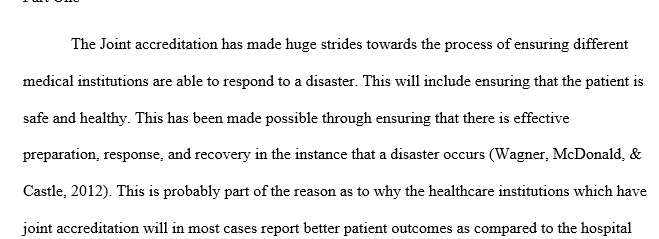Discussion about the joint commission
the two posts of students who answered the following question (“Is being Joint Commission compliant enough to be able to prepare, respond and recover from a disaster? Explain your answer and review the JC Lessons Learned. What lesson learned resonated with you? Why?”)
First Post (1)
Through accreditation the Joint Commission accreditation, organizations have been able to engage in the development and implementation of comprehensive emergency management plans (Wagner, McDonald, & Castle, 2012). However, while there have been gains in quality measures including patient safety and physical restraint use, being compliant to the Joint Commission is not enough to engage in effective preparation, response, and recovery in case disaster strikes. Lam et al. (2018) found that even though Joint Commission hospitals display better results in patient outcomes, the difference with non-JC accredited hospitals is negligible which might be a consequence of competition within local and regional markets which characterizes hospitals. Wagner, McDonald, and Castle (2012) point out that the Joint Commission’s frequent assessments dull the process of emergency management and lessen its impact. Increasing competition and establishing incentives for risk management can contribute to disaster response management too.
The Joint Commission lesson learned
Among the lessons that the Joint Commission learned, one lesson that resonated with me was the one on planning, training and exercising for infectious disease emergencies. This includes training on the process of initial screening as well as the utility of PPE. Care teams also receive iterative training and learn how to carry out safe patient flow from the entry point to isolation as well as ensuring that patients are transferred safely. Training on the use of dedicated equipment and disposal and transport of waste is also important. This resonated with me because all the activities that are outlined within the lesson are all geared towards equipping management teams with patient care skills during emergencies and ensuring favorable patient outcomes.
References
Lam, M. B., Figueroa, J. F., Feyman, Y., Reimold, K. E., Orav, E. J., & Jha, A. K. (2018). Association between patient outcomes and accreditation in US hospitals: an observational study. BMJ, 363(8179), 1-10. doi:10.1136/bmj.k4011
Wagner, L. M., McDonald, S. M., & Castle, N. G. (2012). Joint Commission Accreditation and Quality Measures in U.S. Nursing Homes. Policy, Politics, & Nursing Practice, 13(1), 8-16. doi:10.1177/1527154412443990
Second post (2)
To a large extent, being the joint commission compliance is what it would take to prepare, respond and recover from a disaster. Focusing on the mission of the organization, its culture and how committed it is to constantly improve the safety and quality of care offered it is enough to manage disasters. The organization is assigned the task of accrediting and certificating hospitals and individuals, checking on performance and measuring the standards of services provided by nurses (Joint Commission on Accreditation of Healthcare Organizations., & Joint Commission Resources, 2006).
The organization equips nurses with skills on preparedness to emergency response, and it provides tools that can be used. The Joint Commission International has a wide scope of operation. It has emergency detecting and alerting devices. It holds campaigns to educate the public about basic safety rules in case of any disaster. It allocates finances for the operations, and it has invested in modern technology to help manage disasters. I am convinced that being the Joint Commission compliance is enough to prepare, respond and recover from disasters, through personal commitment also matters a lot.
The lesson that resonated me was “Transparency at all levels” and “putting the patients’ lives the priority.” The primary responsibility of nurses is to save lives. The work culture requires ethics when handling clients. Transparency would help us attain satisfaction. Putting the patients’ safety the priority is another lesson that has been recurring in my education process. It touched me when I realized that there might be individuals whose lives depend on the patient and when one life is lost, other lives that depend on the deceased suffer. Saving one life is saving many lives. This lesson helped me to be passionate and careful when handling patients.
It is with a deep concern that I thought “what if I am involved in a disaster and then I am not treated well?” In short, there is a special and less special life. Treating and caring for victims as I could like to be treated and cared will be my key concern. Someone’s situation today would be my situation tomorrow. To conclude, nurses must remain loyal to offering the best services to patients because this is their primary role and responsibility (Joint Commission Resources, 2012).
References
Joint Commission on Accreditation of Healthcare Organizations & Joint Commission
Resources, Inc. (2006). Meeting the Joint Commission’s 2007 National Patient Safety Goals. Oakbrook Terrace, IL: Joint Commission Resources.
Joint Commission Resources, Inc. (2012). Emergency management in health care: An all-
hazards approach. Oakbrook Terrace, IL: Joint Commission Resources.
please to respond to each post with two paragraphs at least with proper APA citation
Answer preview to discussion about the joint commission
484 words



